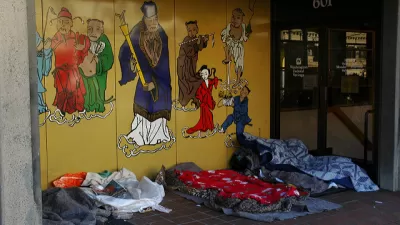A proposed capital gains tax would invest $37 million per year in solving affordable housing and homelessness crises in Seattle.

In Seattle, three tax measures are on the table, reports Natalie Bicknell: "the $500 million 'Amazon Tax' sponsored by Councilmembers Kshama Sawant and Tammy Morales, and the $200 million 'JumpStart Seattle' plan put forth recently by Councilmember Teresa Mosqueda. Now Councilmember Andrew Lewis has introduced a third measure into the mix, a 1% capital gains tax on stocks and bonds when sold for profit that Council Central Staff estimate could raise roughly $37 million per year." The income from the proposed capital gains tax would be used to bankroll homeless and affordable housing services in Seattle.
Given the financial hardship caused by the economic consequences of the coronavirus pandemic, increasing revenue is an issue of great concern to Seattle lawmakers. The financial strain felt by low-income Seattleites means the solution needs to avoid regressive taxation by all means possible. A Washington State Supreme Court ruling reaffirming income is property (and therefore taxable) makes an income tax a regressive option standing in stark contrast to a capital gains tax, which has long been on the table, but has not garnered widespread support in the past. "The fact that the tax’s proceeds would be earmarked specifically for permanent supportive housing and homeless services could bolster support," observes Bicknell.
FULL STORY: A Capital Gains Tax for Seattle? New Progressive Revenue Measure Enters the Conversation

Alabama: Trump Terminates Settlements for Black Communities Harmed By Raw Sewage
Trump deemed the landmark civil rights agreement “illegal DEI and environmental justice policy.”

Planetizen Federal Action Tracker
A weekly monitor of how Trump’s orders and actions are impacting planners and planning in America.

The 120 Year Old Tiny Home Villages That Sheltered San Francisco’s Earthquake Refugees
More than a century ago, San Francisco mobilized to house thousands of residents displaced by the 1906 earthquake. Could their strategy offer a model for the present?

In Both Crashes and Crime, Public Transportation is Far Safer than Driving
Contrary to popular assumptions, public transportation has far lower crash and crime rates than automobile travel. For safer communities, improve and encourage transit travel.

Report: Zoning Reforms Should Complement Nashville’s Ambitious Transit Plan
Without reform, restrictive zoning codes will limit the impact of the city’s planned transit expansion and could exclude some of the residents who depend on transit the most.

Judge Orders Release of Frozen IRA, IIJA Funding
The decision is a victory for environmental groups who charged that freezing funds for critical infrastructure and disaster response programs caused “real and irreparable harm” to communities.
Urban Design for Planners 1: Software Tools
This six-course series explores essential urban design concepts using open source software and equips planners with the tools they need to participate fully in the urban design process.
Planning for Universal Design
Learn the tools for implementing Universal Design in planning regulations.
Clanton & Associates, Inc.
Jessamine County Fiscal Court
Institute for Housing and Urban Development Studies (IHS)
City of Grandview
Harvard GSD Executive Education
Toledo-Lucas County Plan Commissions
Salt Lake City
NYU Wagner Graduate School of Public Service





























